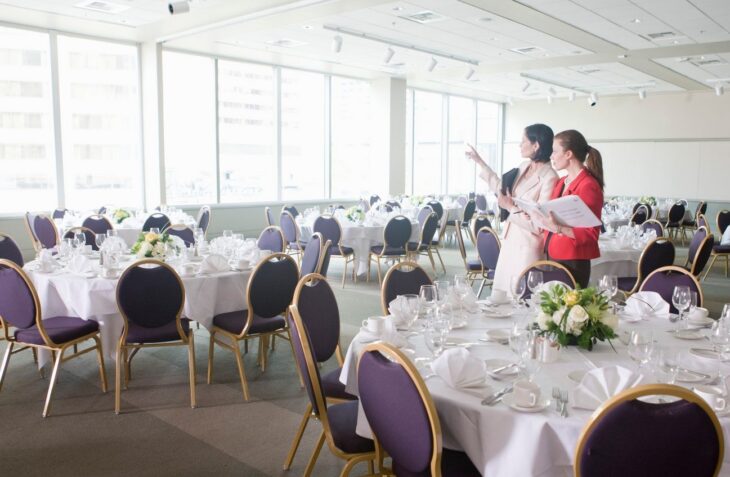There are many circumstances in which you can suddenly find yourself having to plan an event for the first time. Maybe no one else stepped up to organize the office Christmas party, or maybe you’ve decided to handle your wedding reception on your own. Regardless of the situation, there are lots that a beginning event planner should know before they get started, and that’s what we’re here to help you with. Here are some tips that will help you plan an event for the first time.
Contents
1. Outline the main goal

Source: diib.com
Different events have different purposes, and there is a lot you’ll want to achieve with any given event. However, there’s always one or a few goals that are more important than all the others, and the sooner you can identify these main goals, the better. That’s because understanding what absolutely can’t go wrong will allow you to prioritize these elements. And knowing that you have the core goals taken care of will help you stay calm as you take care of secondary stuff.
Take a birthday party, for example. What does a birthday party need? Well, you need the birthday person, and probably a cake. Everything else goes on top of these two core elements to make the party more fun, but these two elements are a priority and should be treated as such.
For a wedding reception, the priorities could be making sure there are plenty of photos and the guests are mingling. And for an office party, the focus could be making sure all the people attending actually get to relax and mingle. What’s most important will always be context-specific, and keeping your priorities in order will be very helpful throughout the whole process.
2. Take stock of your resources

Source: entrepreneur.com
Resources mean money, of course, but it also means more than that. It’s also good to keep track of the material and human resources you have available to help with your event. If it’s going to be held at an office, for example, you may have easy access to office supplies, chairs, desks, and printers to use in order to put together decorations and prizes for the event. If you’re working with a professional venue, they might have everything from chairs to sound systems available for you to borrow and use. Or they might know local suppliers that can rent you these for cheap.
Human resources can be equally as useful. Whether you are planning for family members or coworkers, people on your guest list might have all sorts of skills that can make the planning process easier or add to the party in some way. Look for people with experience with decoration, cooking, event planning, photography, painting, drawing, and anything else you can think of. And if you do end up borrowing talent from friends and family, remember to give them credit during the party.
3. Hire experienced people

Source: partywizz.com
Speaking of human talent, one of the best ways to make sure your event goes smoothly is to hire people with experience. Whether you’re looking for a catering team or hiring professional entertainers from a site like AsherLaub.com, make sure to favor people with experience and a proven track record over those who lack one or both.
There are two reasons for this. First, people with a solid track record are, of course, less likely to cause problems. And the second reason is that people with tons of experience are more likely to be flexible and ready to adapt. So if something doesn’t go according to plan — which is likely to happen if you’re new at planning events — these professionals are more likely to be part of the solution than part of the problem.
4. Manage expectations

Source: thebalancesmb.com
There is a lot that can ruin an event as it is happening, but expectations can ruin an event before it even starts. After all, disappointment happens when expectations aren’t met, so it’s important to avoid the trap of raising people’s expectations to a point where they are impossible to meet.
One way to keep expectations in check is to be careful about what you promise people and what you write in invitations and any other material promoting the event. And if you catch expectations starting to soar due to events going around behind your back, send out a message to as many guests as possible dispelling these rumors before the party. Yes, it can be a downer to pour cold water on people’s excitement, but it’s better than having people realize the rumors were a lie on the day of the event.
5. Build a timeline

Source: sebastianbuza.com
How detailed your timeline needs to be will depend on the type of event you’re hosting. To ensure you don’t miss any crucial steps, referring to a comprehensive event planning checklist can be invaluable in guiding you through the process.
And having an actual timeline in writing can help you spot gaps in time where something needs to happen to keep the night from getting boring.
Remember: it’s not your job to throw entertainment at people’s faces in every single second of the event. People will want time to relax and mingle as well. The key is to find a balance between major attractions and moments of quiet.
6. Leave room in your budget

Source: medium.com
If you’re new at event planning, it’s good to leave somewhere between 10% and 20% of your budget free for emergencies and changes in plan. That’s because things can and will go wrong, and when that happens, you don’t want to be paying for the fixes out of pocket.
7. Plan for the worse

Source: eventbrite.com.au
Anything that can go wrong will go wrong, so you better be prepared. This is another area where keeping your main objective in mind is important: what’s the plan if the birthday person doesn’t arrive home on time? What are you going to do if the musician who was going to perform cancels at the last minute?
It’s wise to keep backups for everything. You can also keep the phone numbers of local event planners and event venues on a shortlist, so you can call them for help in an emergency. After all, if anyone knows who can rent out a sound system on a Sunday afternoon, it’ll be someone who’s been planning weddings in your area for decades.
When it comes to your timeline, it’s good to have a few ideas that you can execute earlier or remove from the schedule as needed to accommodate changes that occur during the event. A good timeline is thorough but flexible.
